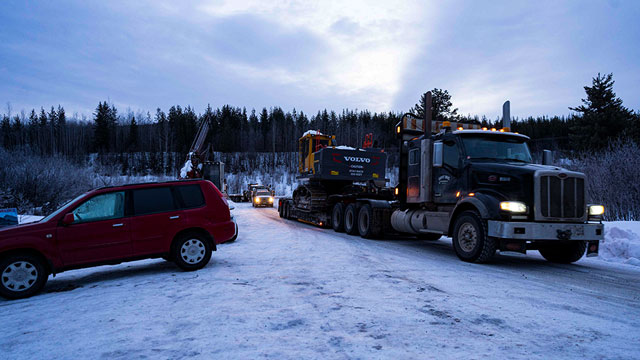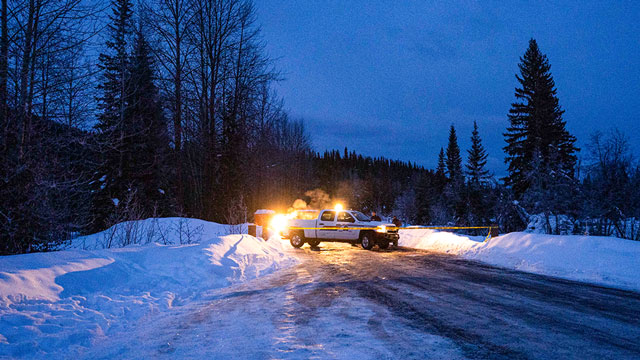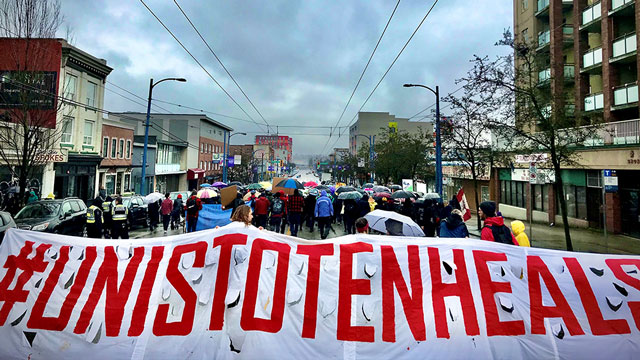RCMP moved in on the Wet’suwet’en territory in an early morning raid that brought dozens of officers and vehicles down on an unconfirmed number of supporters.
“A total of 6 individuals refused to leave the area and were arrested for obstruction,” said a statement released by the RCMP. “One individual was arrested for resisting arrest as well as obstruction. Several individuals, including members of the media, were transferred out for safety reasons, but not arrested.”
Police set up an exclusion zone early in the morning banning all local traffic and media from entering the territory.
Video and images coming from inside that zone show a convoy of vehicles heading up the Morice West Forest Service Rd.
Some of the images show people in handcuffs and being led away by police.
“There’s no reason for it,” said Wet’suwet’en Hereditary Chief Na’Moks in a scrum with reporters outside the exclusion zone later on Thursday. “Our people are peaceful, our supporters are peaceful but they came in with armed forces to remove people that were peaceful doing the right thing, at the right time for the right reasons.
“We’re exercising our jurisdiction.”
(Police escort heavy equipment into the exclusion zone during the raid. Photo: Lee Wilson/APTN)
Also Thursday, hereditary chiefs filed an application for a judicial review of a five-year extension of Coastal GasLink’s environmental assessment certificate, granted by the B.C. government.
People still at the Unist’ot’en Healing Centre said an RCMP aircraft circled the area at least 10 times Thursday after the pre-dawn arrests were made at another camp up the road.
There reports from the camp that that a convoy of about three dozen RCMP vehicles, an ambulance and heavy machinery was on the Morice West Forest Service Road heading toward the healing centre.
“It’s intimidating the level of force they’re bringing here to this remote location to face unarmed people who have stated time and time again we are peacefully living on our territory,” said Wet’suwet’en member Karla Tait from the healing centre.
“But we are feeling strong, we’re feeling confident, we’re feeling resolute in our position.”
Tait said that when officers arrive, members at the healing centre are planning to uphold the eviction notice issued to the company by the First Nation’s hereditary chiefs who say they haven’t given free, prior or informed consent to the project and it violates Wet’suwet’en law.
It’s not clear at the time of this posting how many people were arrested – but it started early.
Gidmit’en spokesperson Molly Wickham was on Facebook early and said the camps started receiving calls at approximately 3 a.m. PT, that police were on their way up the road.
“We’re calling on all of our supporters, all of our people to get ready, get prepared and get here as soon as you can,” she said in the video posted at approximately 3:40 a.m. PT. “Anyone who can’t make it, it’s time to rise up. It’s time to stand up for all Indigenous people across Turtle Island… the RCMP can’t come in and remove us from our territories.”
RCMP said Wednesday that they had delayed enforcing the B.C. Supreme Court injunction for weeks to seek a peaceful resolution, but they had no choice but to follow the court’s orders.
Police asked protesters to either leave or choose to be arrested peacefully.
They issued a statement in the morning stating that the area was in lock down and that local residents and media could be “inconvenienced.”
“The access control checkpoint, which was created on January 13, 2020 to prevent further escalation of the situation and to mitigate safety concerns over hazardous items placed on the roadway, has now been established as a full exclusion zone,” the RCMP said in a statement released Thursday morning.
“As of February 6, 2020, the RCMP will not allow access to anyone who is not part of the enforcement team, with some exceptions for Wet’suwet’en Hereditary Chiefs and Elected Council members by arrangement with the Senior Commander.”
(RCMP set up an exclusion zone to keep media out of the area where the arrests were taking place. Local residents were also not allowed in. Photo: Lee Wilson)
Coastal GasLink president David Pfeiffer said the company will move forward with its construction schedule.
“We will continue to search for opportunities for dialogue with the hereditary chiefs and the Unist’ot’en, to search for common ground that accommodates their concerns and benefits the Wet’suwet’en people,” Pfeiffer said.
Enforcement began less than two days after the provincial government and First Nation failed to reach an agreement during talks intended to de-escalate the dispute.
Fourteen people were arrested as RCMP enforced a similar injunction on the forest service road in January 2019. Two people face criminal charges, while the other charges were dropped.
There was support for the Wet’suwet’en Nation in at least two cities this week.
(A massive banner is carried down Hastings St. in Vancouver. Photo: Simon Charland/APTN)
In Vancouver, about 200 people marched down Hastings St., in the city’s Downtown Eastside, in support of the camps which sit approximately 1,100 kilometres north by road.
Priscilla Omulo was one of the marchers.
“I think it shows that the provincial government is not abiding to to their commitment to UNDRIP,” she said. “And I feel like it was done in a way where they say one thing and do another as it was done without eyes to be seen so if you do something in the middle of the night you know its wrong.”
On the Tyendinega Mohawk Territory, the busy rail line linking Toronto to the east was blocked in support of the Wet’suwet’en camps.
And in Montreal, ahead of the raid, people gathered to support the camps in B.C.
Watch Lindsay Richardson’s story from Montreal.
Assembly of First Nations National Chief Perry Bellegarde issued a statement Thursday afternoon.
“I am urging peace and I condemn any acts of violence in enforcing the injunction brought against the Wet’suwet’en Hereditary Chiefs and their supporters,” said Assembly of First Nations National Chief Perry Bellegarde. “The use of force against peaceful people is a violation of human rights and First Nations’ rights.
“The RCMP is sworn to uphold Canada’s law, but Canada must respect First Nations laws and Wet’suwet’en laws. Canada’s highest law – the Constitution – affirms in section 35 the inherent rights of First Nations and our right to self-determination. We will never achieve reconciliation through force. If this is really about the ‘rule of law’ then governments should be honouring the rights and title of First Nations in their traditional territories.”
Na’Moks said he’s planning on heading into the exclusion zone this evening to check in on people.
He said Coastal Gaslink never asked for permission to come in.
But he said the hereditary chiefs wouldn’t have given it if they did.
-with files from the Canadian Press














Great article, thank you Lee